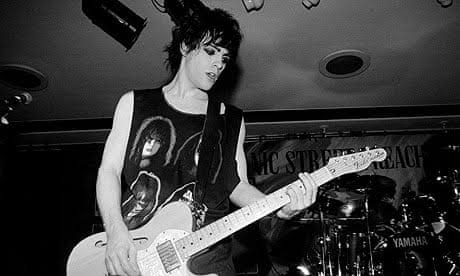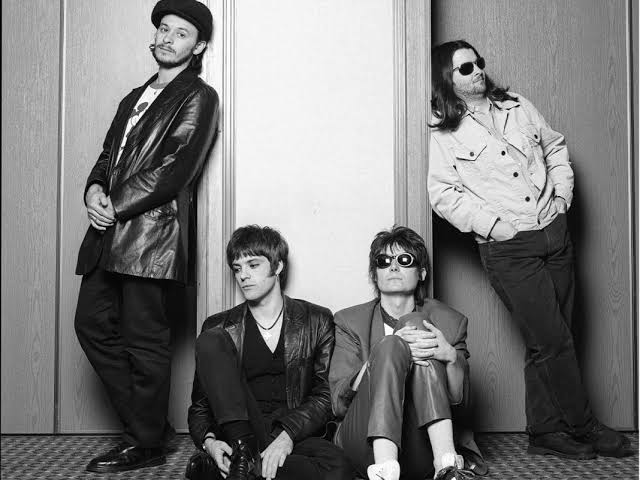By 1995, Richey Edwards had become more than a guitarist. He was the poet of pain for a generation that didn’t flinch from its scars. His band, the Manic Street Preachers, was breaking through walls with both noise and meaning. Their lyrics read like manifestos. Their live shows felt like public confessions. And at the center of it all was Richey—elusive, electric, and increasingly fragile.
On February 1, he was due to fly to the U.S. with lead singer James Dean Bradfield for a promotional tour. But Richey never boarded the plane. That morning, he checked out of London’s Embassy Hotel, left behind his packed suitcase, took his wallet, passport, car keys, and a small bag. He withdrew £200 from a nearby ATM and drove away in his silver Vauxhall Cavalier.
Two weeks later, that car turned up near the Severn Bridge. Locked. Abandoned. A parking ticket had been issued on February 14. The bridge, spanning the River Severn between England and Wales, was known for something more than traffic. It was a suicide site. Authorities feared the worst.
But there was no body. No note. No eyewitness. Only a stalled engine of speculation. From that point forward, Richey Edwards became a question people kept trying to answer.

The Cult of Richey
The man disappeared. The myth did not. Over the years, fans and strangers alike reported sightings. One said they saw him in a market in Goa, India. Another claimed he was in Fuerteventura, living under a new name. Some were certain they met a man matching his description at a monastery in the Canary Islands.
None of these claims were verified. But they were believed—because people wanted to believe.
He had always seemed like someone on the verge of vanishing. Known for carving 4REAL into his arm during a 1991 interview to prove the band’s sincerity, Richey embodied intensity. His lyrics didn’t just flirt with despair. They lived in it. He quoted Sylvia Plath and Mishima. He was reading The Rules of Attraction and The Unbearable Lightness of Being the month he vanished.
His passport was found in the house he left behind. There was no record of international travel. Yet the idea that he might have walked away from fame, from expectation, and from himself became its own kind of truth. Not official, but emotionally real.

Building a Ghost
Richey’s disappearance didn’t just unsettle fans. It shaped the identity of the Manic Street Preachers. Their next album, Everything Must Go, contained tracks he had co-written. But the band made a clear choice—to continue. The grief was audible, but it was also professional. They never replaced him. On stage, they left his spot empty.
Outside the band, Richey was becoming a kind of cultural artifact. His journals were released. His old interviews resurfaced. Fans treated his words like scripture, underlining them, decoding them. Some found clues in his final writings. Others saw a planned escape. Still others believed the pressure became too much.
There were precedents. Artists who had walked away from the spotlight. Writers who faked their deaths. Political radicals who disappeared into communes. But Richey’s story came with a specific ache. He had been transparent about his struggles. In the year before his disappearance, he had checked into psychiatric care. He had been sober. He had seemed, by some accounts, clearer.
But clarity does not equal safety. And genius does not guarantee survival.

What Remains
In 2008, Richey was legally declared dead. His family made the decision after 13 years. For some, it offered closure. For others, it only hardened the belief that the official story could not contain the whole truth.
What remains is presence without presence. Murals in Cardiff. Fan-made zines. Lyrics that still cut like fresh wounds. “I write this alone on my bed,” he once wrote, “I’ve poisoned every room in the house.” Lines like that never stopped echoing.
The Manics went on to win awards and sell out tours, but they never let go of Richey. They honored him quietly and publicly. They kept his memory alive not by explanation, but by refusal to dilute it. Their 2009 album Journal for Plague Lovers used his final lyrics in full.
People often ask whether he planned his disappearance. But maybe that’s the wrong question. Maybe the point is that he was already gone, piece by piece, before anyone noticed. And maybe that’s the story no one wants to tell.
Because it’s harder. It’s quieter. And it reminds us that some disappearances don’t need distance. Just time.





